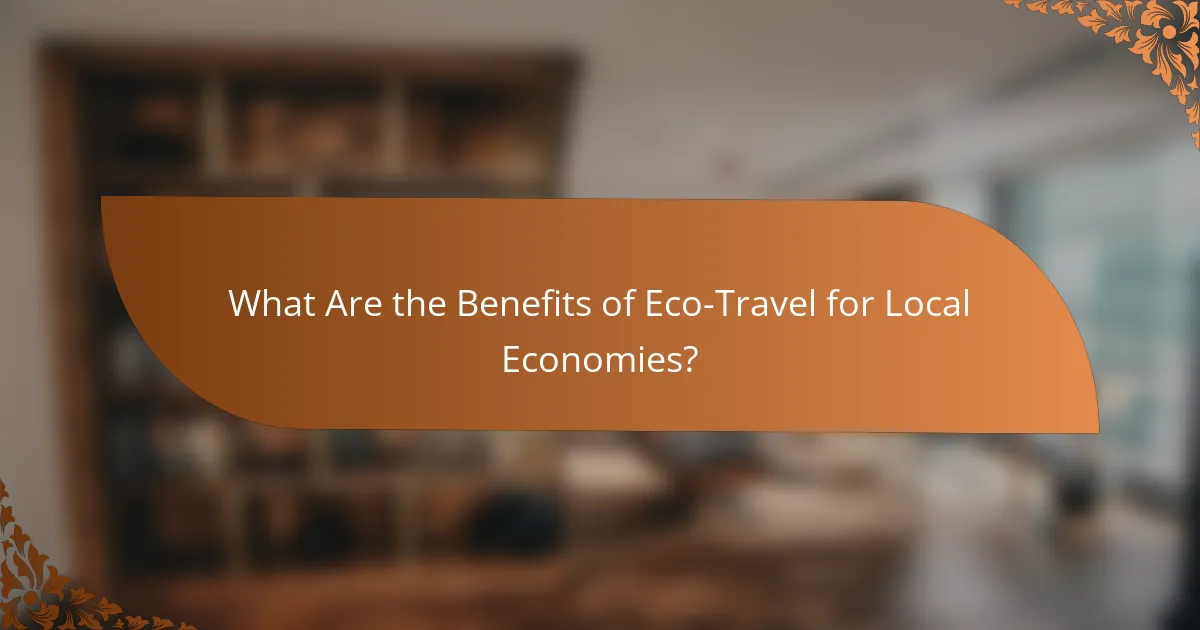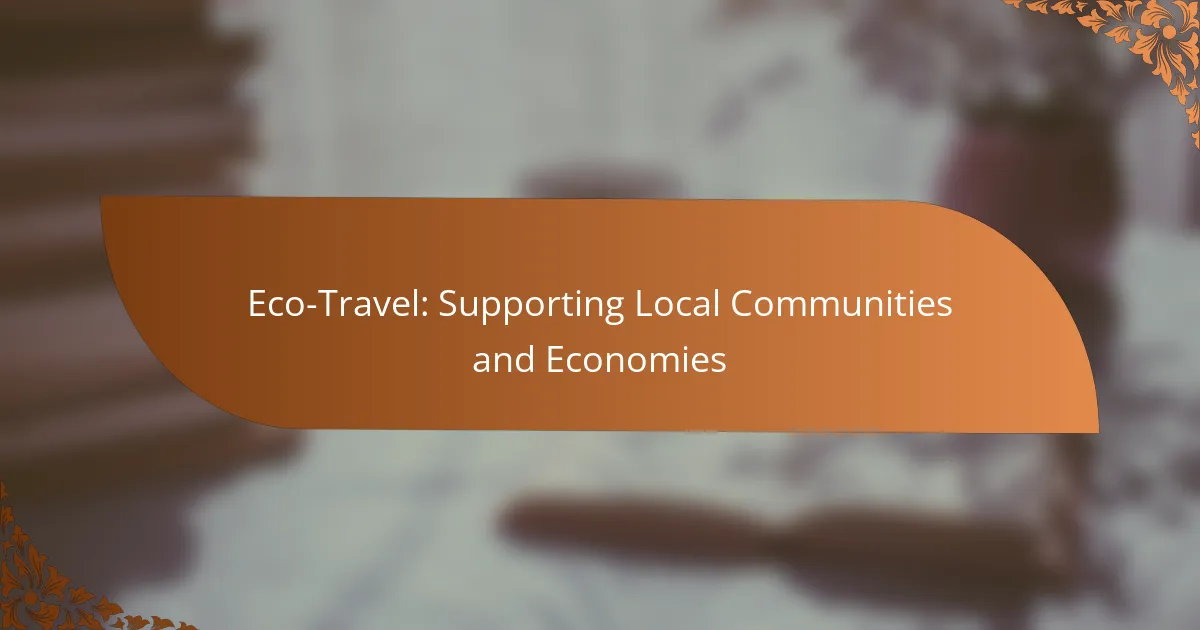Eco-travel is a powerful way to support local communities and economies by creating sustainable economic opportunities and preserving cultural heritage. By choosing responsible tourism practices, travelers can directly contribute to the well-being of the destinations they visit, fostering community development and environmental sustainability. Engaging in eco-travel means making conscious choices that prioritize local resources and services, ensuring that the benefits of tourism are felt by the communities themselves.

How Does Eco-Travel Support Local Communities?
Eco-travel supports local communities by creating sustainable economic opportunities, preserving cultural heritage, and fostering community development. By prioritizing responsible tourism practices, travelers can contribute directly to the well-being of the destinations they visit.
Job creation in tourism
Eco-travel generates jobs in various sectors, including hospitality, guiding, and conservation efforts. Local residents often fill these positions, leading to increased employment rates and economic stability within communities.
For example, eco-lodges and sustainable tour operators frequently hire local guides, cooks, and maintenance staff, which helps to circulate income within the community. This job creation can significantly reduce poverty levels in rural areas.
Preservation of local culture
Eco-travel encourages the preservation of local culture by promoting authentic experiences that respect traditional practices. Tourists are often interested in learning about local customs, which can lead to a renewed appreciation for cultural heritage.
Community-led initiatives, such as cultural festivals or workshops, allow locals to share their traditions with visitors, ensuring that these practices are maintained and valued. This cultural exchange can strengthen community identity and pride.
Investment in community projects
Eco-travel often leads to investments in community projects that improve infrastructure and services. These projects can include building schools, healthcare facilities, or clean water systems, which enhance the quality of life for residents.
Tour operators may contribute a portion of their profits to local development initiatives, ensuring that tourism benefits the community directly. This collaborative approach fosters a sense of ownership and responsibility among locals.
Promotion of local businesses
Eco-travel promotes local businesses by encouraging tourists to shop, dine, and engage with local entrepreneurs. This support helps small businesses thrive and creates a diverse economic landscape.
Travelers can seek out locally-owned restaurants, craft shops, and markets, which not only provides them with unique experiences but also ensures that their spending directly benefits the community. This practice can lead to a multiplier effect, where money circulates within the local economy.
Empowerment of local artisans
Eco-travel empowers local artisans by providing them with a platform to showcase and sell their crafts. This recognition can elevate their status within the community and increase their income potential.
Workshops and cultural exchanges can help artisans develop their skills and expand their market reach. Tourists often appreciate handmade goods, leading to higher demand and fair compensation for local craftspeople.

What Are the Benefits of Eco-Travel for Local Economies?
Eco-travel significantly benefits local economies by generating income, creating jobs, and fostering sustainable practices. By prioritizing local resources and services, eco-tourism helps communities thrive while preserving their cultural and environmental heritage.
Increased revenue for small businesses
Eco-travel boosts revenue for small businesses by attracting tourists who prefer locally-owned accommodations, restaurants, and shops. This influx of visitors can lead to a substantial increase in sales, often resulting in higher profits for these enterprises.
For example, a small eco-lodge may see occupancy rates rise during peak travel seasons, translating to increased earnings that can be reinvested into the community. Tourists often seek authentic experiences, which encourages spending on local crafts and services.
Diversification of local income sources
Eco-travel promotes diversification of income sources by reducing reliance on traditional industries, such as agriculture or fishing. This shift allows communities to explore various avenues for revenue, making them less vulnerable to economic downturns.
For instance, a coastal village that once depended solely on fishing may develop eco-tours, wildlife watching, and cultural experiences, creating new job opportunities and income streams. This diversification can enhance overall economic stability.
Improved infrastructure development
Investment in eco-travel often leads to improved infrastructure, benefiting both tourists and residents. Enhanced roads, better public transportation, and upgraded utilities can result from increased tourism revenue.
In many cases, local governments may prioritize infrastructure projects that support eco-tourism, such as nature trails or visitor centers. These developments not only facilitate travel but also improve the quality of life for local inhabitants.
Enhanced community resilience
Eco-travel contributes to enhanced community resilience by fostering a sense of pride and ownership among residents. When communities engage in sustainable tourism practices, they become more invested in protecting their environment and culture.
For example, local initiatives that promote conservation and responsible tourism can empower residents to take action against environmental threats. This collective effort strengthens community bonds and prepares them to face economic or environmental challenges more effectively.

How Can Travelers Engage in Eco-Travel?
Travelers can engage in eco-travel by making conscious choices that benefit local communities and economies. This involves selecting sustainable options that minimize environmental impact while supporting local cultures and businesses.
Choosing eco-friendly accommodations
Selecting eco-friendly accommodations is a key aspect of eco-travel. Look for hotels, lodges, or hostels that have sustainability certifications, such as LEED or Green Key, which indicate a commitment to environmentally responsible practices.
Consider options like eco-lodges that utilize renewable energy sources, implement water conservation measures, and prioritize local materials in their construction. Staying in these types of places not only reduces your carbon footprint but also often supports local employment.
Participating in local tours
Engaging in local tours can enhance your travel experience while benefiting the community. Choose tour operators that emphasize sustainable practices, such as small group sizes, responsible wildlife viewing, and community engagement.
Participating in tours led by local guides can provide deeper insights into the culture and environment. Look for experiences that give back to the community, such as those that support local artisans or conservation efforts.
Supporting sustainable dining options
Dining at sustainable restaurants is another way to engage in eco-travel. Seek out eateries that source ingredients locally, prioritize organic produce, and minimize food waste. This not only supports local farmers but also reduces the carbon footprint associated with transporting food.
Consider trying traditional dishes that reflect the local culture, as these often use seasonal ingredients. Avoid chain restaurants that may not prioritize sustainability and instead opt for family-owned establishments that contribute to the local economy.
Volunteering for community projects
Volunteering for community projects allows travelers to give back while experiencing local culture. Look for opportunities that align with your skills and interests, such as environmental conservation, education, or community development.
Many organizations offer short-term volunteer programs that can fit into your travel itinerary. Engaging in these projects can foster meaningful connections with locals and provide a unique perspective on the challenges and successes of the community.

What Criteria Should Travelers Consider for Eco-Travel?
Travelers should prioritize eco-friendly practices, community impact, and sustainability measures when planning eco-travel. These criteria help ensure that their travel choices benefit local economies and minimize environmental harm.
Certification of eco-friendly practices
Look for certifications that indicate a commitment to sustainable tourism. Common certifications include Green Globe, EarthCheck, and the Global Sustainable Tourism Council (GSTC) standards. These certifications ensure that businesses adhere to specific environmental and social criteria.
When evaluating accommodations or tour operators, check for visible certifications and read reviews to confirm their authenticity. This can help you avoid greenwashing, where companies falsely claim to be eco-friendly.
Impact on local communities
Consider how your travel choices affect local communities. Supporting local businesses, such as family-owned hotels and restaurants, can significantly boost the local economy. Engaging in community-based tourism activities allows travelers to interact with residents and learn about their culture.
Be cautious of large resorts or chain hotels that may not contribute to the local economy. Opt for experiences that promote cultural exchange and provide fair wages to local workers, ensuring that your travel has a positive impact.
Environmental sustainability measures
Evaluate the environmental practices of your chosen travel options. Look for initiatives like waste reduction, water conservation, and energy efficiency. For example, some hotels implement recycling programs or use renewable energy sources.
Travelers can also reduce their carbon footprint by choosing eco-friendly transportation options, such as trains or electric vehicles, over flying. Additionally, consider participating in local conservation efforts, such as beach clean-ups or wildlife protection programs, to further support environmental sustainability during your travels.
